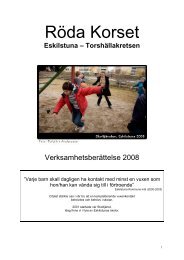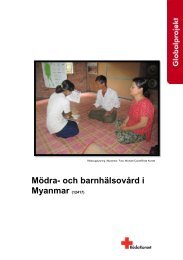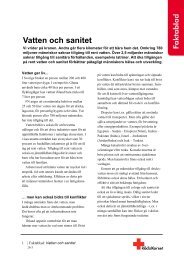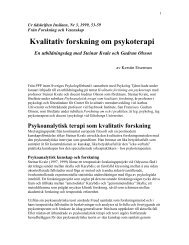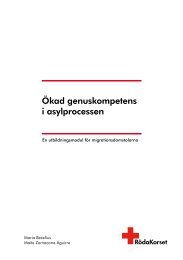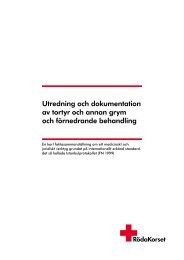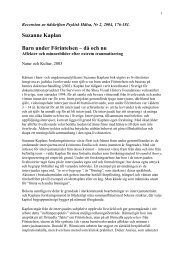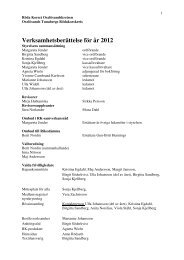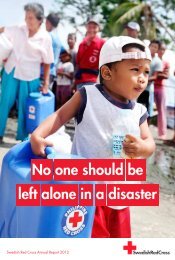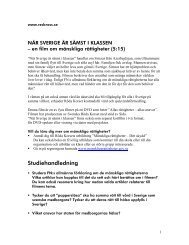chapter 4 - DRK
chapter 4 - DRK
chapter 4 - DRK
You also want an ePaper? Increase the reach of your titles
YUMPU automatically turns print PDFs into web optimized ePapers that Google loves.
Strictly under embargo until Wednesday 22 September at 00:01 GMT (02:01 Geneva time)ownership or other formalized/legal rights toreside at a given location) often bear the bruntof natural disasters and resultant displacementand damage to property. However, on thewhole, post-disaster HLP policy tends to provideclearly preferential treatment to formal propertyowners, often to the detriment of the rights ofthose within the informal or customary sectors,thus raising questions of equity and rights.Structural landlessness and homelessness.Even though pre-disaster landlessand homeless families constitute one of themost vulnerable groups affected by disaster,these families are frequently excluded or at bestmarginalized in relief and recovery processes.This group can include informal occupants orsquatters on public or private land who areunable to return to their homes, such as peopleliving in a coastal buffer zone in post-tsunamiSri Lanka. They can also be pre-disaster tenantswho were not allowed to return to theirformer homes and lands or households headedby women who were not permitted to purchaseproperty or not on the same terms as men. Inpost-tsunami Aceh, more than 15,000 landparcels (7,000 hectares) were irretrievablydamaged, with resettlement on public land asthe only available option. Following the 2005Pakistan earthquake, the failure of the authoritiesto provide housing assistance to the landlesswas identified as a major reason for longtermdisplacement and the prolonged existenceof temporary shelter settlements.Land grabbing and illegal/unfairland acquisition. The unjust acquisition ofland following a disaster can have a detrimentalimpact both on the people whose land is literallystolen and on humanitarian agencies engagedin shelter activities. Land grabbing cantake a variety of forms ranging from outrightviolence (by both public and private actors),to carefully orchestrated legislative measuresdesigned to achieve outcomes in the aftermathof disaster that would have been politically infeasiblehad the disaster itself not taken place.Following Hurricane Katrina in New Orleans,public officials attempted to undertake a rangeof planning and zoning measures during thereconstruction process, which had the actualeffect of significantly changing land use andland and housing ownership patterns – in otherwords, a land grab.Restitution or resettlement? Accordingto relevant international standards, suchas the United Nations Principles on Housingand Property Restitution for Refugees andDisplaced Persons (2005), there is, whenconditions so permit, a presumption of restitutionand an emerging right to return to one’soriginal home for displaced people followingboth disaster and conflict. In many instances,however, restitution can be blocked due to HLPdisputes over a land plot or dwelling, real orattempted land grabs, the secondary occupationof homes and lands and various other commonpost-disaster situations. In post-tsunamiThailand, HLP restitution rights for communitiesliving on land informally were secured throughthe resolution of many HLP disputes by a specialland sub-commission, but in many cases,the technically extralegal or informal tenurestatus held by disaster victims can greatly affecttheir rights in post-disaster settings.Proving who has which HLP rights.Following the Pisco earthquake in Peru, shelterprogramming was affected due to the difficultiesin clarifying the existence of property titlesfor the land potential beneficiaries were occupying.The international community developedprocedures to select reconstruction beneficiaries,which procedures rely on vulnerability criteria(i.e., the elderly, disabled people, childrenand others) and on criteria related to the tenureof the land and properties built on it.World Disasters Report 2010 – Focus on urban risk65



